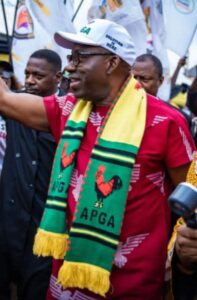
By Romanus Udekwe Okue-Agbomma
A political enthusiast, Joseph Iwunor, has predicted that Governor Charles Chukwuma Soludo will secure victory in the November 8 Anambra gubernatorial election by winning over 18 local government areas before noon, citing six key factors that favour the incumbent’s re-election bid.
Iwunor’s analysis, which presents a comprehensive assessment of Anambra’s electoral dynamics, identifies the state’s informal zoning agreement as the primary advantage for Governor Soludo’s campaign. According to the analyst, this gentlemen’s agreement, whilst not constitutionally mandated, has operated effectively for years to ensure rotational leadership amongst the state’s three senatorial zones.
“This zoning agreement helps to prevent any form of political unrest or power struggle within the state, as it ensures that each zone gets a fair chance at leadership,” Iwunor stated, explaining that the arrangement promotes unity and cooperation amongst different zones through the principle that each must complete an eight-year tenure.
The analyst argued that Governor Soludo, hailing from Anambra South, stands to benefit from support across Anambra Central and North zones, as these areas seek to maintain the rotational balance that guarantees their future turns at leadership. This cross-zonal backing, according to Iwunor, provides substantial electoral advantages that opposition candidates cannot easily overcome.
Religious demographics form another crucial element in the analyst’s electoral calculations. Iwunor highlighted the continued influence of Catholic and Anglican populations on Anambra’s political landscape, noting that these denominations often serve as decisive factors in state elections.
The analysis emphasised Governor Soludo’s identity as “a core and devoted Roman Catholic,” coupled with his deputy Onyeka Ibezim’s connection to “a respected Anglican bishop,” creating what Iwunor described as “a good combo to generate more votes.” This religious positioning contrasts with major opposition candidates who may lack similar denominational advantages.
The strength of APGA’s grassroots political structure received particular attention in Iwunor’s assessment. He described the All Progressives Grand Alliance as possessing “the most powerful political influence and structure in Anambra State,” evidenced through majority control in the State House of Assembly, chairmanship of all 21 local government areas, and strong presence in local councils.
“Educational institutions also reflect this dominance, as a significant majority of lecturers, teachers and civil servants in the state are APGA members,” Iwunor claimed, suggesting deep institutional penetration that extends beyond formal political positions into professional and social networks.
The analyst employed demographic projections to illustrate APGA’s grassroots appeal, stating that “in a typical family of seven in Anambra, five members are APGA supporters.” This sentiment, according to his analysis, extends to market women and youth organisations, reinforced through slogans like “Onye Ahana Nwanne Ya” and “Nkia Bu Nke Anyi” that encourage local solidarity.
Iwunor identified what he termed “religious political stunts” as a strategic advantage for Governor Soludo, particularly the governor’s alignment with Christian voters who constitute over 85% of the state’s population. The analysis suggested that Soludo’s declaration of Anambra as a Christian state and his positioning against traditional spiritual practices have solidified support amongst Christian voters.
“This bold maneuver seems to be paying off, as Soludo now enjoys considerable sympathy and support from the Christian population in Anambra,” the analyst observed, framing these moves as calculated political strategy rather than spontaneous policy decisions.
The branding strategy employed by the Soludo administration received analysis through the lens of political marketing. Iwunor noted the governor’s practice of inscribing state projects with his personal trademark “Solution,” creating visual identification between infrastructure development and his leadership.
“This strategy directly projects his name and mark into the public mind, making each project visually identifiable with his leadership skills,” the analyst explained, suggesting that consistent branding creates recognition, trust, and emotional attachment that translates into political support.
Opposition weakness formed the final pillar of Iwunor’s electoral prediction. He cited Governor Soludo’s public characterisations of rival candidates, including describing YPP’s Sir Paul Chukwuma as “merely creating awareness for the future” and expressing similar dismissive sentiments about Labour Party’s Chief George Moghalu.
The analysis portrayed APC candidate Dr. Nicholas Ukachukwu as lacking competitive credentials against Governor Soludo in academic, professional, and leadership categories. According to Iwunor, these public characterisations contribute to perceptions of weak opposition that may influence voter attitudes and campaign dynamics.
“With this few points and analysis of my, I can categorically conclude that Governor Charles Chukwuma Soludo will complete his 8 years tenure as Anambra Governor,” Iwunor stated in his assessment, expressing confidence in the incumbent’s electoral prospects.
The analysis represents one perspective on Anambra’s electoral landscape, though actual voting outcomes depend on numerous factors including voter turnout, campaign effectiveness, and unforeseen political developments leading up to the November election.
Political observers note that whilst Iwunor’s factors may influence electoral outcomes, the democratic process ultimately rests with voters’ choices on election day, making definitive predictions challenging despite apparent structural advantages for any particular candidate.



